Imagine standing at the precipice of a breathtaking panorama, the air crisp and invigorating. You yearn to capture the essence of this moment, to share its beauty with others. But your vocabulary feels inadequate, a feeble tool unable to paint the picture in your mind. This is the frustration many students grapple with, an inability to express themselves fully due to a limited vocabulary. Mastering vocabulary is not merely about memorizing definitions but about unlocking a deeper understanding of language and its nuanced power.

Image: kemarstavya.blogspot.com
This article delves into Unit 7 of Vocabulary Workshop Level C, providing comprehensive answers and insights that can empower you to explore the world of words with confidence. We will delve into the intricacies of the unit’s challenging vocabulary, offering strategies to conquer those seemingly daunting terms. Prepare to unlock the hidden potential within yourself, expanding your vocabulary and empowering your communication skills.
Delving into the Depths of Unit 7: A Journey Through Vocabulary
Unit 7 of Vocabulary Workshop Level C introduces a captivating array of words, each with its unique shade of meaning and application. This unit explores concepts that have shaped civilizations and continue to influence our lives today. We will navigate these words, unraveling their intricacies and understanding their practical implications.
1. The Art of Persuasion: Eloquence and Rhetoric
-
Eloquent (adj.) – The power of speech is a potent weapon, one that can sway opinions and inspire action. Eloquence captures this essence, referring to speech that is fluent, persuasive, and emotionally compelling. Picture a skilled orator captivating their audience with their words, their voice resonating with truth and conviction. This is eloquence in action.
-
Rhetoric (n.) – While eloquence emphasizes the artistry of speech, rhetoric embraces the art of persuasion itself. It encompasses the principles and techniques used to effectively communicate and influence others. From crafting arguments to leveraging emotional appeals, rhetoric explores the complexities of human communication.
-
Exhort (v.) – Imagine a leader urging their followers to take action, their voice resonating with passion and conviction. This is the essence of exhortation, the act of strongly urging or advising someone to do something. Exhortation can be powerful in its ability to inspire and motivate, encouraging others to embrace a cause or pursue a specific path.
2. Facing Adversity: Resilience and Enduring Challenges
-
Tenacious (adj.) – Life throws curveballs, challenges that test our resolve. In the face of adversity, tenacious individuals stand firm. They refuse to give up, demonstrating unwavering determination and persistence. Think of a marathon runner who pushes through fatigue, their tenacity propelling them towards the finish line.
-
Indomitable (adj.) – Beyond tenacity, indomitable spirit embodies a fierceness of will, an unyielding resolve that cannot be subdued. This quality shines in individuals who overcome seemingly insurmountable obstacles, their spirit unyielding even in the face of overwhelming odds.
-
Imperturbable (adj.) – Imagine the calm amidst a storm, a sense of composure that remains unshaken. Imperturbability captures this ability to remain unflustered, unmoved by external pressures. It represents a level of mental fortitude that allows individuals to maintain their equilibrium even in the most trying situations.
3. Exploring the Hidden Depths: Subterfuge and Deception
-
Subterfuge (n.) – The world is not always what it seems. Subterfuge unveils the realm of secrets and deception, the art of using trickery or concealment to achieve a desired outcome. It is a dance of shadows, where truth is veiled and hidden agendas drive actions.
-
Dissimulation (n.) – To dissimulate is to conceal the truth, to present a false facade. It involves disguising one’s true thoughts or intentions, often to gain an advantage or avoid unwanted consequences. Dissimulation is a tactic employed by those seeking to manipulate or mislead others.
4. The Essence of Power: Dominion and Authority
-
Dominion (n.) – Dominion refers to supreme power or authority, a sense of complete control over a realm or sphere of influence. It is a potent concept that encompasses the ability to command, govern, and dictate. Consider the vast empires of history, their rulers wielding dominion over vast territories.
-
Confer (v.) – Power is not always wielded unilaterally. Conferring implies the act of granting power or authority to another. It involves a transfer of influence, often based on mutual agreement or trust.
-
Accede (v.) – Imagine a request being presented, and a decision to grant it being made. Accede signifies the act of agreeing to a demand or request, often reluctantly or out of necessity.
5. The Weight of Words: Understanding Nuance and Context
-
Erudite (adj.) – To be erudite is to be learned, possessing deep knowledge and understanding. It involves being well-read, well-versed in a particular subject, and capable of engaging in insightful discussions. Picture an academic scholar sharing their expertise, their erudition inspiring awe and admiration.
-
Perspicacious (adj.) – Beyond knowledge, perspicacity adds a keenness of insight, an ability to perceive the truth or understand hidden meanings. It involves a sharp intellect capable of discerning nuances and drawing insightful conclusions.
-
Convivial (adj.) – Imagine a gathering filled with laughter, where conversations flow effortlessly, and spirits are lifted. Conviviality captures this atmosphere of warmth and pleasantness, a sense of joy and shared enjoyment in the company of others.
Mastering Vocabulary: Strategies for Success
-
Active Learning: Don’t just read the definitions. Write the words down, create flashcards, and use them in sentences. The more you actively engage with the vocabulary, the more firmly it will be embedded in your memory.
-
Contextual Understanding: Analyze how words are used in sentences and paragraphs. Pay attention to their synonyms and antonyms. This will help you understand the subtle nuances of each word and its appropriate usage.
-
Real-World Application: Seek opportunities to use these new words in your everyday conversations and writing. This will reinforce your understanding and make learning more engaging.
-
Practice, Practice, Practice: Repetition is key. Review the vocabulary regularly, both individually and with classmates. The more you practice, the more natural these words will become in your vocabulary.

Image: bmp-get.blogspot.com
Vocabulary Workshop Level C Answers Unit 7
Unlocking Your Potential: Embracing the Power of Words
Learning vocabulary is not merely about expanding your knowledge. It’s about unlocking a world of possibilities, empowering you to communicate effectively, to analyze complex concepts, and to navigate the intricacies of the human experience. As you delve into Unit 7 of Vocabulary Workshop Level C, remember that each word is a building block, contributing to a broader foundation of linguistic fluency. With dedication and consistent effort, you can unlock your potential, making your voice heard with clarity, eloquence, and conviction.






